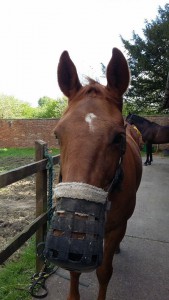Needing to control the diet is a common issue that we are often quizzed about, as many horses are overweight or require a diet low in sugar and starch. It is very easy to restrict what hay and hard feed our horses receive, and we can tailor these parts of the diet to be ideal for your horse’s needs. However, when out at grass it can be very difficult to know how much your horse is eating, and it is thought a horse can eat as much as 5% of its body weight per day when at pasture. For horses requiring calorie control, or those who need low levels of sugar in their diet, restricting grazing can be vital to ensure full health, and at this time of year too much grass can be particularly detrimental due to high NSC (sugar) levels in the plant. There are a few ways that you can restrict grazing; by strip grazing, using sheep to graze a field down, or by using a turnout area with no grass. For many people, these are not an option, and so we often recommend using a grazing muzzle. Grazing muzzles, when used correctly, are a very handy bit of kit, allowing your horse to be turned out as normal, so they can keep moving around in their field and importantly socialise with field mates, whilst not being allowed to gorge on grass. Studies have shown that by using a grazing muzzle on a horse they will consume between 50-86% less grass than those without! So using a muzzle really can be a great way to restrict the grass that your horse is eating, but do ensure that you are aware of the following before you turn your horse out:
There are a few ways that you can restrict grazing; by strip grazing, using sheep to graze a field down, or by using a turnout area with no grass. For many people, these are not an option, and so we often recommend using a grazing muzzle. Grazing muzzles, when used correctly, are a very handy bit of kit, allowing your horse to be turned out as normal, so they can keep moving around in their field and importantly socialise with field mates, whilst not being allowed to gorge on grass. Studies have shown that by using a grazing muzzle on a horse they will consume between 50-86% less grass than those without! So using a muzzle really can be a great way to restrict the grass that your horse is eating, but do ensure that you are aware of the following before you turn your horse out:
- It is suggested that you do not use a muzzle for more than 12 hours at a time. Ideally, bring the horse into a stable or turnout without grass for the other 12 hours, and supply with either soaked hay or use our low starch and low sugar Fibre Blocks to allow the horse to meet their daily fibre needs. Taking the muzzle off also allows you to check for any rubbing or sores.
- Make sure that your horse can drink through the muzzle- some horses take a while to adapt!
- If the grass is growing very quickly and the muzzled horse is not losing weight as required, it may be that you have to remove them from grazing completely.
- Some horses like to remove grazing muzzles so do keep an eye on your horse the first few times they are turned out with one on!
- If your horse is on a restricted diet providing vitamins and minerals in a condensed pellet, such as SlimAid, is an ideal way to ensure that they are getting all their nutrient needs.
 See, we do practice what we preach! I used a grazing muzzle on my old mare for the first time last year, and now won’t be without one! A combination of being out at night with a muzzle on and in during the day with a couple of fibre blocks made such a difference to this mares weight, which for the first time didn't massively increase over the summer! Olivia Colton Msc.
See, we do practice what we preach! I used a grazing muzzle on my old mare for the first time last year, and now won’t be without one! A combination of being out at night with a muzzle on and in during the day with a couple of fibre blocks made such a difference to this mares weight, which for the first time didn't massively increase over the summer! Olivia Colton Msc.











